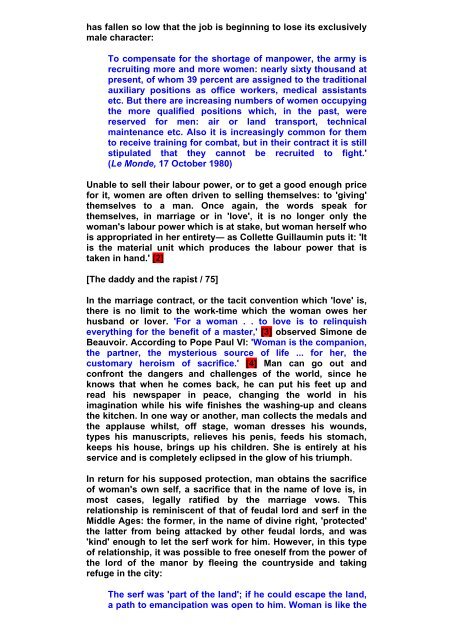emmanuel reynaud holy virility the social construction of masculinity
emmanuel reynaud holy virility the social construction of masculinity
emmanuel reynaud holy virility the social construction of masculinity
You also want an ePaper? Increase the reach of your titles
YUMPU automatically turns print PDFs into web optimized ePapers that Google loves.
has fallen so low that <strong>the</strong> job is beginning to lose its exclusively<br />
male character:<br />
To compensate for <strong>the</strong> shortage <strong>of</strong> manpower, <strong>the</strong> army is<br />
recruiting more and more women: nearly sixty thousand at<br />
present, <strong>of</strong> whom 39 percent are assigned to <strong>the</strong> traditional<br />
auxiliary positions as <strong>of</strong>fice workers, medical assistants<br />
etc. But <strong>the</strong>re are increasing numbers <strong>of</strong> women occupying<br />
<strong>the</strong> more qualified positions which, in <strong>the</strong> past, were<br />
reserved for men: air or land transport, technical<br />
maintenance etc. Also it is increasingly common for <strong>the</strong>m<br />
to receive training for combat, but in <strong>the</strong>ir contract it is still<br />
stipulated that <strong>the</strong>y cannot be recruited to fight.'<br />
(Le Monde, 17 October 1980)<br />
Unable to sell <strong>the</strong>ir labour power, or to get a good enough price<br />
for it, women are <strong>of</strong>ten driven to selling <strong>the</strong>mselves: to 'giving'<br />
<strong>the</strong>mselves to a man. Once again, <strong>the</strong> words speak for<br />
<strong>the</strong>mselves, in marriage or in 'love', it is no longer only <strong>the</strong><br />
woman's labour power which is at stake, but woman herself who<br />
is appropriated in her entirety― as Collette Guillaumin puts it: 'It<br />
is <strong>the</strong> material unit which produces <strong>the</strong> labour power that is<br />
taken in hand.' [2]<br />
[The daddy and <strong>the</strong> rapist / 75]<br />
In <strong>the</strong> marriage contract, or <strong>the</strong> tacit convention which 'love' is,<br />
<strong>the</strong>re is no limit to <strong>the</strong> work-time which <strong>the</strong> woman owes her<br />
husband or lover. 'For a woman . . to love is to relinquish<br />
everything for <strong>the</strong> benefit <strong>of</strong> a master,' [3] observed Simone de<br />
Beauvoir. According to Pope Paul VI: 'Woman is <strong>the</strong> companion,<br />
<strong>the</strong> partner, <strong>the</strong> mysterious source <strong>of</strong> life ... for her, <strong>the</strong><br />
customary heroism <strong>of</strong> sacrifice.' [4] Man can go out and<br />
confront <strong>the</strong> dangers and challenges <strong>of</strong> <strong>the</strong> world, since he<br />
knows that when he comes back, he can put his feet up and<br />
read his newspaper in peace, changing <strong>the</strong> world in his<br />
imagination while his wife finishes <strong>the</strong> washing-up and cleans<br />
<strong>the</strong> kitchen. In one way or ano<strong>the</strong>r, man collects <strong>the</strong> medals and<br />
<strong>the</strong> applause whilst, <strong>of</strong>f stage, woman dresses his wounds,<br />
types his manuscripts, relieves his penis, feeds his stomach,<br />
keeps his house, brings up his children. She is entirely at his<br />
service and is completely eclipsed in <strong>the</strong> glow <strong>of</strong> his triumph.<br />
In return for his supposed protection, man obtains <strong>the</strong> sacrifice<br />
<strong>of</strong> woman's own self, a sacrifice that in <strong>the</strong> name <strong>of</strong> love is, in<br />
most cases, legally ratified by <strong>the</strong> marriage vows. This<br />
relationship is reminiscent <strong>of</strong> that <strong>of</strong> feudal lord and serf in <strong>the</strong><br />
Middle Ages: <strong>the</strong> former, in <strong>the</strong> name <strong>of</strong> divine right, 'protected'<br />
<strong>the</strong> latter from being attacked by o<strong>the</strong>r feudal lords, and was<br />
'kind' enough to let <strong>the</strong> serf work for him. However, in this type<br />
<strong>of</strong> relationship, it was possible to free oneself from <strong>the</strong> power <strong>of</strong><br />
<strong>the</strong> lord <strong>of</strong> <strong>the</strong> manor by fleeing <strong>the</strong> countryside and taking<br />
refuge in <strong>the</strong> city:<br />
The serf was 'part <strong>of</strong> <strong>the</strong> land'; if he could escape <strong>the</strong> land,<br />
a path to emancipation was open to him. Woman is like <strong>the</strong>
















